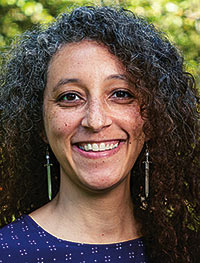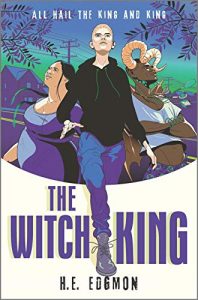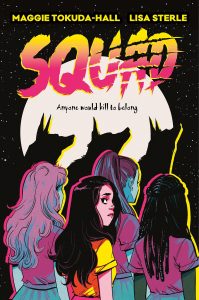The Year in Review 2021 by Alex Brown
 For me, 2021 was a year of increasing challenges. Just when it seemed like things might be looking up, something awful would jump out of the shadows and bring it all back down again. Fiction, especially of the romance and speculative genres, helped me keep my head above water even during the worst of it.
For me, 2021 was a year of increasing challenges. Just when it seemed like things might be looking up, something awful would jump out of the shadows and bring it all back down again. Fiction, especially of the romance and speculative genres, helped me keep my head above water even during the worst of it.
Let’s start off with my favorite adult spec fic books. C.L. Polk closed out their Kingston Cycle series with the lovely Soulstar, centering on nurse Robin and her spouse Zelind as they finish the revolution started by Miles, Tristan, Grace, and Avia. Chuck Wendig delved into the horrors of dysfunctional families in The Book of Accidents, a doorstopper of a novel that was so good I read it twice, in print and in audiobook (narrated by the incredible Xe Sands & George Newbern). She Who Became the Sun by Shelley Parker-Chan, about a young monk-turned-warrior who takes fate into her own hands, is one of those books that is so good I’ll be recommending it for years to come. Earlier this year I read Katherine Addison’s 2014 novel The Goblin Emperor for the first time and fell madly in love with everything about it. So you can imagine how thrilled I was to learn the sort-of-sequel, The Witness for the Dead, was coming out over the summer. Despite being much shorter, the second is just as good as the first. I also really loved the shocking cruelties of The Echo Wife by Sarah Gailey, the epic imagination of Son of the Storm by Suyi Davies Okungbowa, the bloody delight of My Heart is a Chainsaw by Stephen Graham Jones, and the remixed attitude of The Chosen and the Beautiful by Nghi Vo.
For novellas, After the Dragons by Cynthia Zhang, A Spindle Splintered by Alix E. Harrow, and Local Star by Aimee Ogden are probably my favorite of the bunch. I enjoyed the bittersweet hope running through Zhang’s story about a dying dragon rescuer and a hopeless romantic scientist in China in the not-too-distant future, the ways Harrow twisted fairytale tropes into something wholly new, and the action-packed queer fun of Ogden’s space opera.
 Although I read a lot of YA, I don’t read much science fiction, but I’m glad I squeezed in Lilliam Rivera’s We Light Up the Sky, about three teens trying to save Los Angeles from an alien invasion in a post-COVID world, and E.K. Johnston’s Aetherbound, an unexpectedly moving story about queer teens building their own families in space. Speaking of queer stories, The City Beautiful by Aden Polydoros, What We Devour by Linsey Miller, The Heartbreak Bakery by A.R. Capetta, and The Witch King by H.E. Edgmon blended fantasy and queerness in powerful, profound ways. Polydoros focused on the queer Jewish immigrant experience in 19th-century Chicago, Miller broke down stereotypes on asexuality, and Capetta and Edgmon explored gender identity. These books upheld a variety of identities and intersectionalities so well that even though I wasn’t the target audience I still came out of them feeling seen and heard. With The Mirror Season, Anna-Marie McLemore used magical realism to tell a heartbreaking yet ultimately hopeful story about surviving sexual assault. Darcie Little Badger introduced me to Indigenous Futurism with A Snake Falls to Earth, about two teens in the near future who use the wisdom of their ancestors and the techniques of scientific study to protect the ones they love. Heidi Heilig’s trilogy-ender On This Unworthy Scaffold and Makiia Lucier’s standalone Year of the Reaper didn’t get nearly as much attention as they deserved; both had compelling premises and characters you can’t help but root for.
Although I read a lot of YA, I don’t read much science fiction, but I’m glad I squeezed in Lilliam Rivera’s We Light Up the Sky, about three teens trying to save Los Angeles from an alien invasion in a post-COVID world, and E.K. Johnston’s Aetherbound, an unexpectedly moving story about queer teens building their own families in space. Speaking of queer stories, The City Beautiful by Aden Polydoros, What We Devour by Linsey Miller, The Heartbreak Bakery by A.R. Capetta, and The Witch King by H.E. Edgmon blended fantasy and queerness in powerful, profound ways. Polydoros focused on the queer Jewish immigrant experience in 19th-century Chicago, Miller broke down stereotypes on asexuality, and Capetta and Edgmon explored gender identity. These books upheld a variety of identities and intersectionalities so well that even though I wasn’t the target audience I still came out of them feeling seen and heard. With The Mirror Season, Anna-Marie McLemore used magical realism to tell a heartbreaking yet ultimately hopeful story about surviving sexual assault. Darcie Little Badger introduced me to Indigenous Futurism with A Snake Falls to Earth, about two teens in the near future who use the wisdom of their ancestors and the techniques of scientific study to protect the ones they love. Heidi Heilig’s trilogy-ender On This Unworthy Scaffold and Makiia Lucier’s standalone Year of the Reaper didn’t get nearly as much attention as they deserved; both had compelling premises and characters you can’t help but root for.
For the Black Excellence in YA category, I have to give it to Bad Witch Burning by Jessica Lewis, This Poison Heart by Kalynn Bayron, and Redemptor by Jordan Ifueko. Each highlighted different Black experiences, from a teen struggling to survive in a world designed to crush them, to a teen with a strong support system and a long line of ancestors holding them up, to a teen with the resolve to remake the world into something better.
 My favorite young-adult graphic novels this year both dealt with queerness (no surprise there). In Maggie Tokuda-Hall & Lisa Sterle’s Squad, Becca’s new Mean Girl friends turn out to be a pack of werewolves who spend their weekends killing leering dudebros and two-faced nice guys. Molly Knox Ostertag’s The Girl from the Sea is about 15-year-old Morgan and her secret selkie girlfriend as they process grief, loss, family, and identity.
My favorite young-adult graphic novels this year both dealt with queerness (no surprise there). In Maggie Tokuda-Hall & Lisa Sterle’s Squad, Becca’s new Mean Girl friends turn out to be a pack of werewolves who spend their weekends killing leering dudebros and two-faced nice guys. Molly Knox Ostertag’s The Girl from the Sea is about 15-year-old Morgan and her secret selkie girlfriend as they process grief, loss, family, and identity.
I can’t forget to talk about short speculative fiction! I get through 30-50 stories a month from nearly 60 publications, and out of all that, these are some of the ones that stuck with me the most. The inaugural issue of Mermaids Monthly delivered L.D. Lewis’s ‘‘From Witch to Queen and God’’, a killer story about Black anti-colonial sea witches punishing their oppressors. Fireside published ‘‘Mouth & Marsh, Silver & Song’’ by Sloane Leong, a gorgeously lyrical story from a tremendous writer. John Wiswell and Diabolical Plots’ ‘‘For Lack of a Bed’’, does chronic pain with a fantasy twist. ‘‘The Night Farmers’ Museum’’ from Alisa Alering and Lady Churchill’s Rosebud Wristlet takes the reader on a fascinating journey through the history of a fantasy land through text placards in a museum exhibit. Uncanny Magazine had the distinct privilege of hosting P. Djèlí Clark’s latest story, ‘‘If the Martians Have Magic’’, a glorious take on the Black diaspora, community, and power told through the lenses of alternate history, science fiction, and fantasy. It’s been a few months but I’m still not over Jana Bianchi’s ‘‘Not Quite What We’re Looking for Right Now’’, a seering, scathing Fireside story about a brutal rejection letter. Isabel J. Kim’s Cast of Wonders piece, ‘‘AP Practical Literary Theory Suggests This Is A Quest (Or: What Danny Did Over Spring Break)’’ is a fun, funny, and endearingly charming young-adult story about a group of friends who set out on a quest to bring their bestie back to life.
Here’s hoping 2022 is better than the last, but if nothing else, at least we had some great speculative fiction.
Alex Brown is a queer Black librarian and writer. They have written two books on the history of Napa County, California’s marginalized communities. They write about adult and young adult science fiction, fantasy, and horror as well as BIPOC history and librarianship. Diversity, equity, inclusion, and access set the foundation of all their work. Alex lives in Southern California with their pet rats and ever-increasing piles of books.
This review and more like it in the February 2022 issue of Locus.
 While you are here, please take a moment to support Locus with a one-time or recurring donation. We rely on reader donations to keep the magazine and site going, and would like to keep the site paywall free, but WE NEED YOUR FINANCIAL SUPPORT to continue quality coverage of the science fiction and fantasy field.
While you are here, please take a moment to support Locus with a one-time or recurring donation. We rely on reader donations to keep the magazine and site going, and would like to keep the site paywall free, but WE NEED YOUR FINANCIAL SUPPORT to continue quality coverage of the science fiction and fantasy field.
©Locus Magazine. Copyrighted material may not be republished without permission of LSFF.







